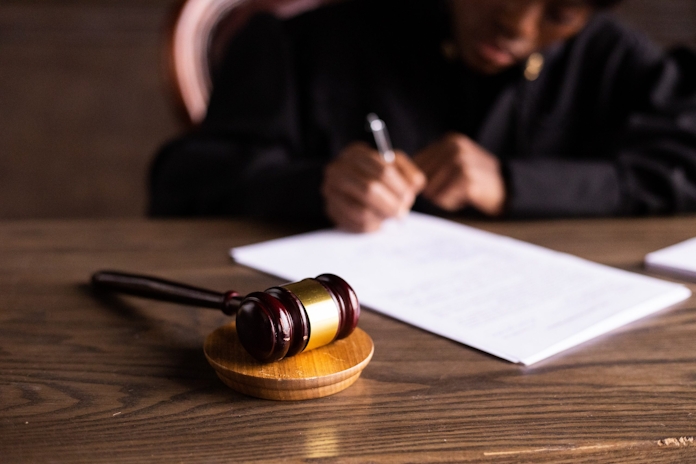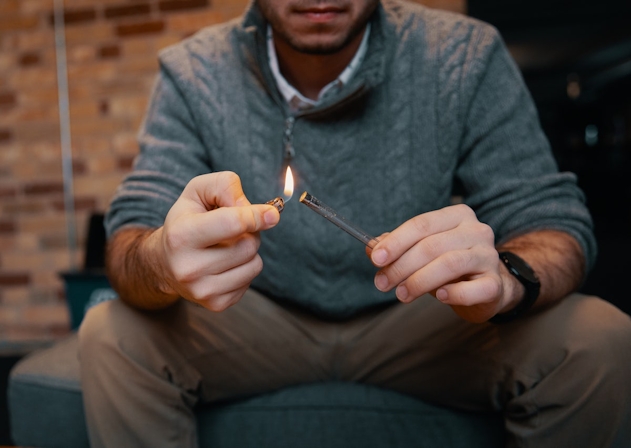
Photo by EKATERINA BOLOVTSOVA / Pexels
What Are The U.S. Drug Paraphernalia Laws For 2024?
A look at U.S. regulations on cannabis consumption accessories
While it remains illegal at the federal level to possess, sell or use weed or paraphernalia anywhere in the United States, many state laws differ on the legality of recreational or medicinal use of marijuana and paraphernalia.
U.S. drug paraphernalia laws can be very confusing to understand, but it is important to be aware of them if traveling with or purchasing cannabis paraphernalia.
What Is Drug Paraphernalia

Photo by Svitlana / Adobe Stock Photo
The federal government has defined paraphernalia as “any equipment, product, or material of any kind that is primarily intended or designed for use in manufacturing, compounding, converting, concealing, producing, producing, processing, preparing, injecting, ingesting, inhaling, or otherwise introducing into the human body a controlled substance.”
There is a loophole in this definition that allows bongs, grinders, pipes, and many other smoking accessories to be sold and purchased with less fear of prosecution, and the key term is “controlled substance.”
Tobacco Only, Please
The term “Tobacco Use Only” is popping up all over the country in storefronts where paraphernalia is sold; “bong” is being replaced by the term “water pipe.” Store owners make it clear to customers, and to the government, that they are not selling items to aid the use or consumption of marijuana, which is still considered an illegal substance in many places. Rather, these items are marketed for use with tobacco or hookah products, both of which are completely legal substances anywhere in the US.
The trick to this loophole is that it only works with clean pieces of paraphernalia, and even then it can be left to interpretation, depending on how strict the area you are in.
Neither buyer nor seller can reference items in relation to weed or for use with weed, a mistake many buyers make before they are asked to leave a store.
Be aware of where you are. If you’re in California or Colorado, places famous for their legalization laws, the chances of getting into any serious trouble are probably slim. Conversely, being in a place known for its anti-marijuana legislation, such as Utah or Alabama, could have much more serious consequences for people caught with paraphernalia.
The Federal Controlled Substances Act of 1970 VS The Farm Bill of 2018
The Federal Controlled Substances Act of 1970 establishes federal regulations governing the production, distribution, and possession of cannabis and other narcotics. The law states that any substance containing more than 0.3% THC (tetrahydrocannabinol) is considered a controlled substance and is therefore subject to federal law.
Unfortunately and by transitivity, this means that the production and distribution of certain cannabis consumption accessories, such as pipes and bongs, is prohibited by federal law.
On the other hand, there is the 2018 Farm Bill, also known as the Farm Bill, legalized the production and sale of industrial hemp in the United States.
This law also allowed the use of hemp derivatives, such as CBD, as long as they contain less than 0.3% THC. This means that certain accessories for cannabis consumption, such as vaporizers and CBD oils, are allowed by federal law.
As you can see, here we start with the gray areas where it is not so clear what is legal and what is not when it comes to cannabis paraphernalia.
Federal regulations can be very confusing, let alone when we start to dive into state and local regulations.
State Regulations
While as mentioned above, some federal laws may prohibit certain cannabis paraphernalia, states have the authority to establish their own regulations.
This means that the legality of certain accessories for cannabis consumption may vary from state to state. For example, in some states, pipes and bongs can be sold, while in others, these accessories are prohibited.
Usually the states that are more advanced with cannabis legalization are those that tend to give more freedom for accessories alike. Although it never hurts to check the laws of each state before doing anything.
Is Drug Paraphernalia Illegal In The U.S.?

Photo by Jonathan Coward / Herb
Simple possession of paraphernalia is not a federal offense in principle. However, under some state laws, merely possessing or having these items is illegal.
Police can check for drug residue, and if it is clear that the item was used to smoke illegal substances, that person may face drug paraphernalia charges.
According to the drug paraphernalia statute, it states that it is unlawful for any person to:
- Sell or offer for sale drug paraphernalia;
- To use the mails or any other facility of interstate commerce for the transportation of drug paraphernalia;
- To import or export drug paraphernalia.
Examples Of Drug Paraphernalia
You may be wondering what drug paraphernalia looks like, some of the most popular are:
- Pipes (metal, wood, acrylic, glass, stone, plastic or ceramic)
- Water pipes
- Miniature spoons
- Bongs
- Smoking papers
Traveling With Paraphernalia
While traveling, it is best to keep any paraphernalia clean. This way, if you are caught with anything, there is less chance of being criminally charged; you can also say it is for tobacco use only.
Flying with marijuana or paraphernalia is never advisable. Although airports do not conduct specific checks for weed or paraphernalia, many areas have police K-9 units and, in most cases, they can and will detect marijuana.
Most states consider possession of paraphernalia to be a misdemeanor, but habitual offenders or extreme situations can result in more serious charges or even jail time.
In many cases, the severity of the charges will be determined by the law enforcement officer who catches you with the illegal item. Therefore, always act coolly, calmly and intelligently.
The best way to protect yourself, whether traveling or at home, is to keep items clean and put away when not in use. Always inform yourself of the specific state laws in your locality before traveling or purchasing paraphernalia.
Penalties For Possession Or Distribution Of Paraphernalia
Under federal law, the maximum penalty for selling paraphernalia is three years plus a fine. Depending on state law, penalties may vary.
While most states treat the distribution of paraphernalia as a misdemeanor, some punish it as a felony if it involves the sale of items to minors.
Our recommendation is that you always check the laws of the place where you are or intend to go, so you will avoid possible problems with the authority.
Herb Recommended Products:
READ MORE










